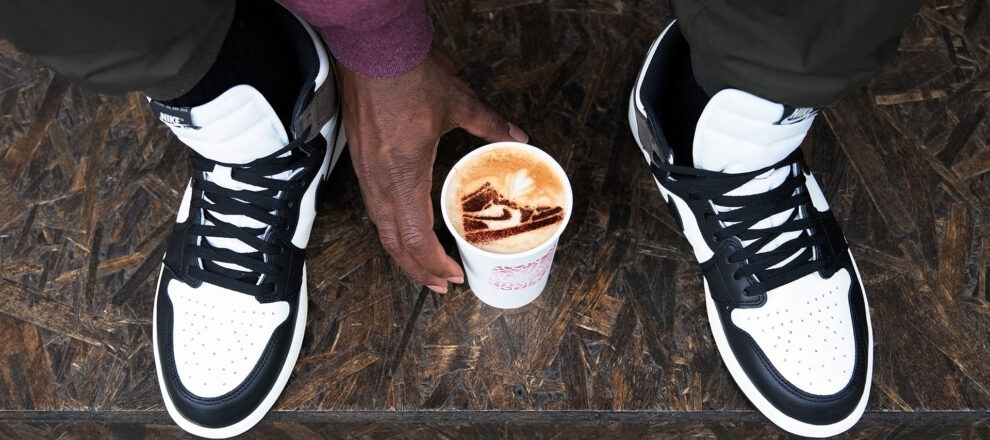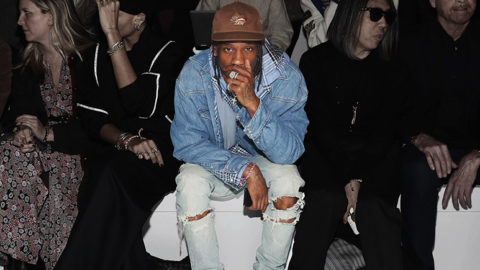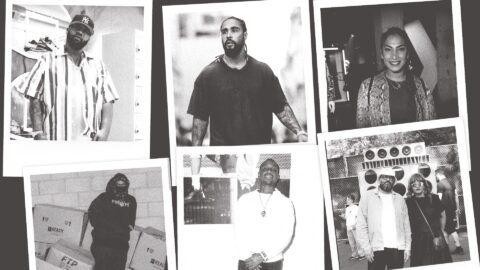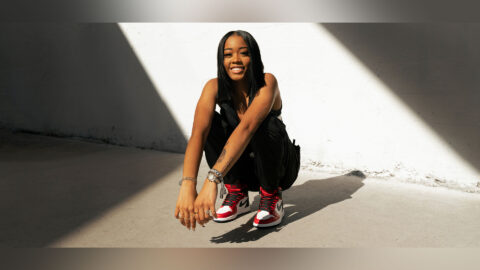The sneaker-themed coffee shop knows that serving its community is more important than ever.
Words: Terrence Watson
Photography: Ashley Walters
The “More Than Sneakers” series highlights community members and cultural leaders. Each story includes unique and inspiring reflections about the impact of their favorite Air Jordans.
It’s late May of 2015, and I’m in Portland, Oregon. As a native New Yorker still new to the Rose City, who had just finished up a three-month work trip, I had yet to really venture outside of a small, Northwestern part of the city known as the Pearl District. My then-creative director suggested that I take advantage of the day’s clear skies and head down to nearby Old Town Chinatown, to check out the streetwear and sneaker shops. I had no clue that an area with that type of cultural vibe existed in Portland.
As I walked through the neighborhood, a kicks display in a window caught my attention. The store was called Compound, a local staple in the center of the area’s growing streetwear scene. When I made it upstairs, my jaw dropped as I processed what I was seeing: a young Black man, who seemed to be around the same age as me, standing behind a wooden coffee cart with the Jordan Brand elephant print etched into the front of it. It was a subtle, if-you-know-you-know touch. Even though I had never met him before, I knew exactly what was going on.
“Hi, I’m Ian Williams,” the man said. “Welcome to Deadstock Coffee.”
In less than a year, Ian opened a new storefront location for Deadstock Coffee across the street. It’s a hub for what he considers Portland’s two most similar groups: sneakerheads and coffee snobs. Given the city’s history with both kicks and coffee, you’d think the union would have happened a long time ago. It took a person like Ian, with an eye for the unorthodox, to combine the two. As the owner of one of the first sneaker-themed coffee shops in the world, Ian has a unique history, including in the footwear industry.
It’s late May of 2015, and I’m in Portland, Oregon. As a native New Yorker still new to the Rose City, who had just finished up a three-month work trip, I had yet to really venture outside of a small, Northwestern part of the city known as the Pearl District. My then-creative director suggested that I take advantage of the day’s clear skies and head down to nearby Old Town Chinatown, to check out the streetwear and sneaker shops. I had no clue that an area with that type of cultural vibe existed in Portland.
As I walked through the neighborhood, a kicks display in a window caught my attention. The store was called Compound, a local staple in the center of the area’s growing streetwear scene. When I made it upstairs, my jaw dropped as I processed what I was seeing: a young Black man, who seemed to be around the same age as me, standing behind a wooden coffee cart with the Jordan Brand elephant print etched into the front of it. It was a subtle, if-you-know-you-know touch. Even though I had never met him before, I knew exactly what was going on.
“Hi, I’m Ian Williams,” the man said. “Welcome to Deadstock Coffee.”
In less than a year, Ian opened a new storefront location for Deadstock Coffee across the street. It’s a hub for what he considers Portland’s two most similar groups: sneakerheads and coffee snobs. Given the city’s history with both kicks and coffee, you’d think the union would have happened a long time ago. It took a person like Ian, with an eye for the unorthodox, to combine the two. As the owner of one of the first sneaker-themed coffee shops in the world, Ian has a unique history, including in the footwear industry.

Photo of Ian Williams by David Wright Jr.
Before dreaming up cups of coffee and lattes with cocoa-flavored sneaker art, Ian had a nine-year career at Nike. He went from being a Nike Air bag maker to a janitor to a footwear developer — a story fit for the big screen. While still a janitor, he convinced the Nike SB team to give him a shot at designing a shoe, which resulted in the Nike SB Dunk High Wet Floor. That shoe that took Ian from cleaning to creating.
Soon after the shoe’s release, Ian’s feel-good story led to more opportunities, though it took time. Forever a strategist, Ian always knew that relationships were key. He took the janitor role, because without a college degree, he knew that he could still drop gems during daily interactions with the right people. Even if that meant taking out the trash at first, he was willing to put in the work to be seen and heard. He even had a spare desk in the hallway of Nike’s Mia Hamm building, and kept a fresh box of candy on it, so that busy employees could stop by for conversations.
Ian’s always thinking through the details of how to create a lasting, enjoyable environment for those around him. His love of community is the core of what inspired Deadstock. At the end of our first interaction, back in 2015, he gave me a punch card dubbed a homie card. And I still have it.
Below, we caught up with Ian to discuss his journey, Deadstock’s role in the community and where he wants to take things in the future.

Deadstock turned five this year. What have been the biggest challenges and rewards, so far?
The biggest reward has been watching the community grow and come together through coffee — just watching people connect over a love of whatever else it may be. From sneakers, you get into art, music, cars, clothes and more.
Our love for sneakers is where it really starts. One of the biggest challenges has been getting people to understand the coffee side of things. They look at us like we’re a shoe store, when we’re actually a community space. We’re a coffee shop, not a bunch of people who just happen to serve coffee.
The idea of snob-free coffee can also be applied to the discerning sneaker community. Do you see similarities between the two worlds?
Oh yeah. There are definitely similarities. The people who love sneakers and the people who love coffee are often the same people. You just love a premium thing; you love the craft. People might judge someone who’s into sneakers and spends $200 or $300 on a pair of shoes. But if you take the $5 that someone spends every day on coffee, that’s a lot more when you add it all up. It’s all based on experience. I think that’s the coolest part.

Deadstock definitely has that barbershop environment. We talk about everything, from sneakers and sports to just life, in general. This year has brought up some new discussions. How have the conversations at Deadstock shifted to more serious topics?
Part of the reason we opened up the shop was to answer the question, “Where do the people who look like us go? Where do the Black people go?” We wanted to create the feel of a barbershop, but make it a place where men, women and people of all colors and backgrounds could come in and get the same experience. We wanted a place where Black people and people of color would feel comfortable, like they can just be themselves.
So this year, instead of going out and saying who to vote for, we’re definitely taking a stand on the importance of voting. You have to do your part, because there are people who can’t. Even the idea of not being able to vote, or thinking that your vote doesn’t matter, is a form of voter suppression.
You’ve persevered and navigated through the pandemic, both pandemics. How have you and your team kept going?
The goal, for us, is to make everything as normal as possible. It’s important that we do everything we can to keep Deadstock open, because a lot of people see Deadstock as a place to go — a place to start their day or take a break. Also, all of the employees need jobs. We didn’t have to let the team go, which is really dope.

What does it say about how the Portland community feels about Deadstock, since you’ve been able to remain open during the pandemic?
I think it says that we’ve built a good foundation. It feels good to know that people are willing to make sure that a lot of these small businesses are taken care of and stay open. When Covid-19 and lockdown measures hit, there were a few days when I was like, “I guess I have to figure out how to get rid of the milk in the refrigerator, so we don’t have any perishables going bad, and then we just shut it down.” It became really obvious that our customers weren’t going to let us shut down.
Are sneakers that incorporate or reference coffee special to you? How do you feel about the new Air Jordan I Dark Mocha?
When I was first getting into coffee, and even when I was first getting into sneakers, I thought that the Mocha IIIs were the coolest thing ever. When I was really looking into opening the shop, I found a pair, and I still have them in relatively good condition. I wear them every once in a while. We put the Mochas next to a cup of coffee, or when we do an event, we have Mochas up on the counter. People get really excited, because they’re like, “Oh yeah, that makes sense.”
If you’re into sneakers, being able to see correlations between the sneakers and the coffee is really dope. Now, the AJI [Dark Mocha] is another shoe in the arsenal for what we call “Hype-Baristas.” Everyone who works in the shop is a Hype-Barista. Having a shoe that’s fire, that we can work in behind the bar, is dope. It’s primarily leather, so we can wipe it off when it gets dirty, and it’s also brown, so it has the mocha color. When coffee gets on it, it’s no problem. It almost makes it cooler.

Are there any Jordans in your collection, or on display in the shop, that have special meaning to you?
Of course, we have [AJ3] Mochas in there right now. I think the OG Mochas are upstairs in the office. For a while, I had a pair of Derek Anderson PEs in there. Those were pretty dope. I like VIs a lot. I had some Motorsports VIs. I love racing. I wish I had the Motorsports IV and V. Those are two shoes I wish I had.
Why do you think sneakers, and Jordans, in particular, mean so much to people all over the world? Why are they more than just sneakers?
I think sneakers identify moments. I was having a conversation with my homie about this. He was like, “Man, for every single pair of shoes I have, I can tell you exactly the way I got them, how much I paid for them, where I was and which store I bought them at, because it’s so personal.” He’s had a shoe store for almost 15 years now. He’s like, “Man, I still get excited about shoes.”
I think it’s because sneakers signify a moment. Growing up, I had one pair a year, so it’d be my game shoe, and then, at the end of the year, it became my play shoe. If I wanted to have multiples in my collection, then I had to take care of them all year. I can still remember all the days when I got to pick up a pair, crack open that box and smell the new shoes.

Full Article: Read Here





